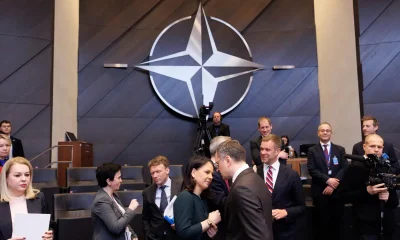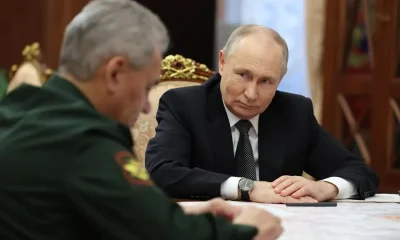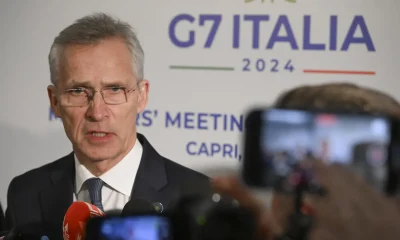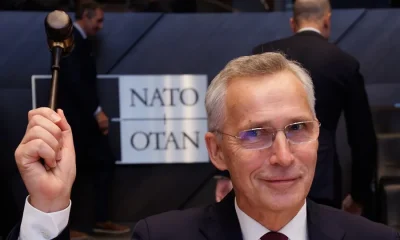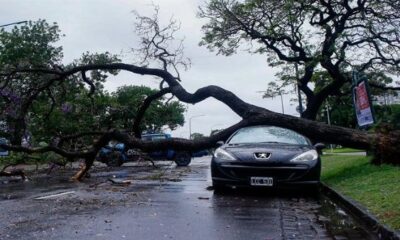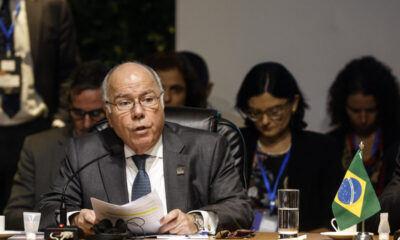International
Argentina asks to be a “global partner” of NATO
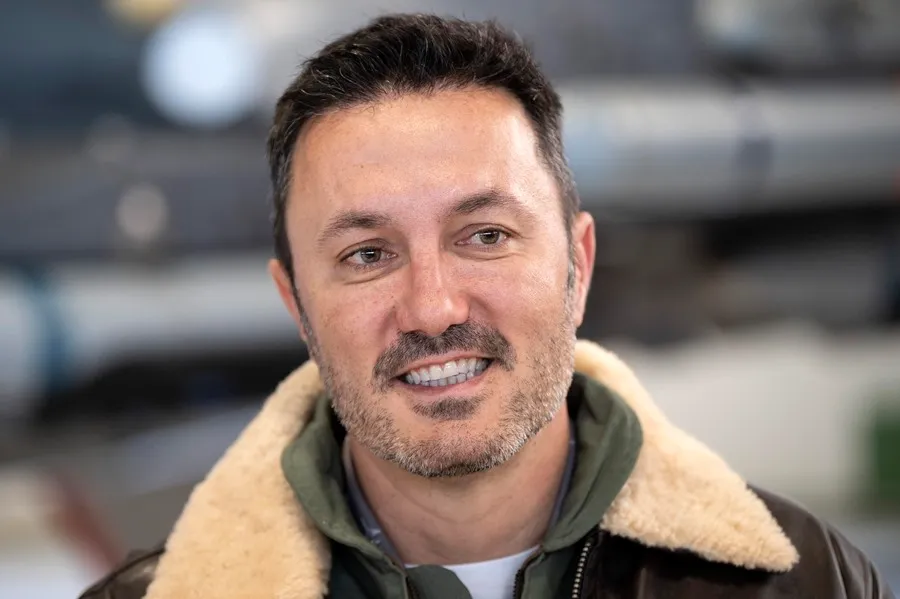
Argentina requested to be a “global partner” of NATO in the framework of a meeting held this Thursday by its Minister of Defense, Luis Petri, and the deputy secretary general of the multilateral organization, Mircea Geoana, official sources reported.
As published by the holder of the portfolio on social network X and disseminated his ministry, Petri presented “the letter of intent that expresses Argentina’s request to become a global partner of this organization.”
“We will continue to work on recovering links that allow us to modernize and train our forces to the NATO standard,” concluded the Argentine Minister of Defense.
Petri accompanied his publication with several photographs – including that of the delivery of the official letter – of his meeting with Geoana in Brussels, where the headquarters of the North Atlantic Treaty Organization (NATO) is located.
Argentina’s rapprochement with NATO is linked to the new foreign policy developed by the Government of the ultraliberal Javier Milei, which has as references the United States and Israel.
In addition to the recent visit to Argentina of the commander of the Southern Command of the United States, Army General Laura Richardson, with a vocation to expand collaboration in defense, the South American country is clearly aligned with Israel both in the war in the Gaza Strip against the armed wing of Hamas and in the recent crisis unleashed with Iran.
Petri is this week in Europe, where on Monday he signed an agreement for the purchase of 24 used F-16 fighter planes from the Danish Army.
Milei was going to travel to Denmark to meet with the Prime Minister, Mette Frederiksen, and celebrate the signing of the agreement, but suspended the visit following Iran’s attack on Israel and returned from the United States – where he had traveled to receive a tribute from a Jewish organization – to organize a “crisis committee” in Buenos Aires.
Argentina keeps in its memory the memory of two serious attacks against the interests of the Jewish community: in 1992 against the Embassy of Israel; and in 1994 against the Asociación Mutual Israelita Argentina (AMIA). Both left more than 100 dead and hundreds of injured.
As its official website shows, NATO has 32 full members. Born after World War II (1939-1945), twelve countries signed their accession in 1949: Belgium, Canada, Denmark, the United States, France, Iceland, Italy, Luxembourg, Norway, the Netherlands, Portugal and the United Kingdom.
They were joined, in various expansions, Greece, Turkey, Germany, Spain, Czech Republic, Hungary, Poland, Bulgaria, Slovakia, Slovenia, Estonia, Latvia, Lithuania, Romania, Albania, Croatia, Montenegro, North Macedonia, Finland and Sweden – the last two incorporations, in 2023 and 2024, respectively, against the background of the war between Russia and Ukraine.
In addition, it has several allies qualified as global partners, the same status that Argentina now intends: Australia, Afghanistan, Iraq, Japan, South Korea, Mongolia, New Zealand, Pakistan and Colombia, the only country in Latin America, admitted in 2017.
Undoubtedly, an important aspect that could generate some internal conflict is the diplomatic dispute over the sovereignty of the Falkland Islands between the United Kingdom – one of the founding members of NATO – and Argentina, which caused a war in 1982.
International
Dominican ‘False Hero’ Arrested for Faking Role in Nightclub Collapse That Killed 231

A man identified as Rafael Rosario Mota falsely claimed to have rescued 12 people from the collapse of the Jet Set nightclub in Santo Domingo—a tragedy that left 231 people dead—but he was never at the scene.
Intelligence agents in the Dominican Republic arrested the 32-year-old man for pretending to be a hero who saved lives during the catastrophic incident, authorities announced.
Rosario Mota had been charging for media interviews in which he falsely claimed to have pulled survivors from the rubble after the nightclub’s roof collapsed in the early hours of April 8, during a concert by merengue singer Rubby Pérez, who was among those killed.
“He was never at the scene of the tragedy,” the police stated. The arrest took place just after he finished another interview on a digital platform, where he repeated his fabricated story in exchange for money as part of a “media tour” filled with manipulated information and invented testimonies.
“False hero!” read a message shared on the police force’s Instagram account alongside a short video of the suspect, in which he apologized: “I did it because I was paid. I ask forgiveness from the public and the authorities.”
Central America
Nicaraguan Exiles to Mark 7th Anniversary of 2018 Protests with Global Commemorations

The Nicaraguan opposition in exile announced on Thursday that it will commemorate the seventh anniversary of the April 2018 protests against the government of President Daniel Ortega and his wife, Rosario Murillo, with events in Costa Rica, the United States, and several European countries.
The commemorative activities—which will call for justice for the victims, as well as freedom and democracy for Nicaragua—will include religious services, public forums, cultural fairs, and other public gatherings, according to official announcements.
In April 2018, thousands of Nicaraguans took to the streets to protest controversial reforms to the social security system. The government’s violent response quickly turned the demonstrations into a broader call for the resignation of President Ortega, who is now 79 and has been in power since 2007.
The protests resulted in at least 355 deaths, according to the Inter-American Commission on Human Rights (IACHR), although Nicaraguan organizations claim the toll is as high as 684. Ortega has acknowledged “more than 300” deaths and maintains the unrest was an attempted coup d’état.
International
Arsenal stun Real Madrid at the Bernabéu to reach Champions League semifinals

Arsenal enjoyed a “historic night” on Wednesday after defeating Real Madrid 2-1 at the Santiago Bernabéu, knocking them out of the Champions League quarterfinals, midfielder Declan Rice said.
“It’s such a special night for this club, a historic night for this club,” said Rice, who scored twice in the first leg in London, speaking to TNT Sports.
The English international was named Man of the Match in both legs — the 3-0 win in London and the second leg in Madrid.
“It’s amazing. I knew we were on an upward trajectory and we’ve done incredibly well in this competition. We deserve it and we have full confidence in our coach. Reaching the semifinals is unbelievable,” Rice added.
-

 International5 days ago
International5 days agoNightclub Collapse in Dominican Republic Claims 226 Lives
-

 International5 days ago
International5 days agoVenezuela accuses Guyana of “warlike intentions” after UK defense deal
-

 Central America3 days ago
Central America3 days agoHonduran Police Offer $135K for Tips Leading to the Arrest of Romeo Vásquez
-

 Central America2 days ago
Central America2 days agoPetro questions Ecuador’s vote, cites reports of military control and arrests
-

 International3 days ago
International3 days agoMPV Denounces Electoral Blockade as Secretary-General is Disqualified for May Elections
-

 International1 day ago
International1 day agoArsenal stun Real Madrid at the Bernabéu to reach Champions League semifinals
-

 International3 days ago
International3 days agoMaduro Plans Major Workers’ March on May 1st to Defend Venezuela’s Freedom
-

 International1 day ago
International1 day agoBogotá residents line up for yellow fever vaccine amid national alert
-

 International1 day ago
International1 day agoMexico refuses to restore ties with Ecuador while Noboa remains in office
-

 International1 day ago
International1 day agoDeSantis’ immigration crackdown sparks alarm in Venezuelan Communities in Doral
-

 International2 days ago
International2 days agoColombia: Search continues for missing limb of italian scientist found dismembered
-

 International8 hours ago
International8 hours agoDominican ‘False Hero’ Arrested for Faking Role in Nightclub Collapse That Killed 231
-

 Central America8 hours ago
Central America8 hours agoNicaraguan Exiles to Mark 7th Anniversary of 2018 Protests with Global Commemorations
























